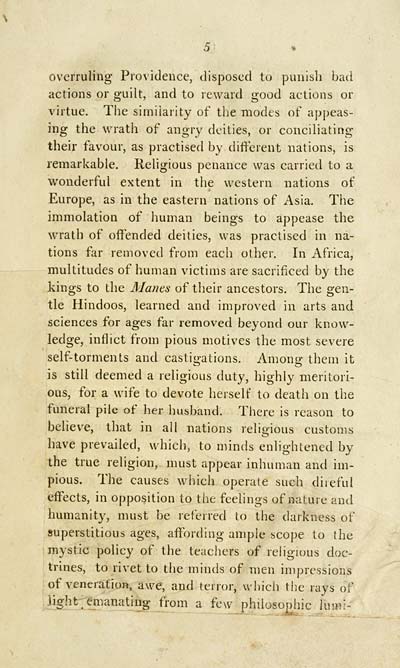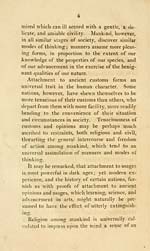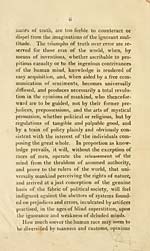Download files
Complete book:
Individual page:
Thumbnail gallery: Grid view | List view

overruling Providence, disposed to punish bad
actions or guilt, and to reward good actions or
virtue. The similarity of tlie modes of appeas-
ing the wrath of angry deities, or conciliating
their favour, as practised by different nations, is
remarkable. Religious penance was carried to a
wonderful extent in the western nations of
Europe, as in the eastern nations of Asia. The
immolation of human beings to appease the
wrath of offended deities, was practised in na-
tions far removed from each other. In Africa,
multitudes of human victims are sacrificed by the
kings to the Manes of their ancestors. The gen-
tle Hindoos, learned and improved in arts and
sciences for ages far removed beyond our know-
ledge, inflict from pious motives the most severe
self- torments and castigations. Among them it
is still deemed a religious duty, highly meritori-
ous, for a wife to devote herself to death on the
funeral pile of her husband. There is reason to
believe, that in all nations religious customs
have prevailed, which, to minds enlightened by
the true religion, must appear inhuman and im-
pious. The causes which operate such direful
effects, in opposition to the feelings of nature and
humanity, must be referred to the darkness of
superstitious ages, affording ample scope to the
mystic policy of the teachers of religious doc-
trines, to rivet to the minds of men impressions
of vencratioR, awe, and terror, which the rays of
ii§l'^i?P^"^ti%Jrom a few philosonhic himi-
actions or guilt, and to reward good actions or
virtue. The similarity of tlie modes of appeas-
ing the wrath of angry deities, or conciliating
their favour, as practised by different nations, is
remarkable. Religious penance was carried to a
wonderful extent in the western nations of
Europe, as in the eastern nations of Asia. The
immolation of human beings to appease the
wrath of offended deities, was practised in na-
tions far removed from each other. In Africa,
multitudes of human victims are sacrificed by the
kings to the Manes of their ancestors. The gen-
tle Hindoos, learned and improved in arts and
sciences for ages far removed beyond our know-
ledge, inflict from pious motives the most severe
self- torments and castigations. Among them it
is still deemed a religious duty, highly meritori-
ous, for a wife to devote herself to death on the
funeral pile of her husband. There is reason to
believe, that in all nations religious customs
have prevailed, which, to minds enlightened by
the true religion, must appear inhuman and im-
pious. The causes which operate such direful
effects, in opposition to the feelings of nature and
humanity, must be referred to the darkness of
superstitious ages, affording ample scope to the
mystic policy of the teachers of religious doc-
trines, to rivet to the minds of men impressions
of vencratioR, awe, and terror, which the rays of
ii§l'^i?P^"^ti%Jrom a few philosonhic himi-
Set display mode to: Large image | Transcription
Images and transcriptions on this page, including medium image downloads, may be used under the Creative Commons Attribution 4.0 International Licence unless otherwise stated. ![]()
| Early Gaelic Book Collections > Ossian Collection > Thoughts on the origin and descent of the Gael > (17) |
|---|
| Permanent URL | https://digital.nls.uk/82234648 |
|---|
| Description | Selected books from the Ossian Collection of 327 volumes, originally assembled by J. Norman Methven of Perth. Different editions and translations of James MacPherson's epic poem 'Ossian', some with a map of the 'Kingdom of Connor'. Also secondary material relating to Ossianic poetry and the Ossian controversy. |
|---|
| Description | Selected items from five 'Special and Named Printed Collections'. Includes books in Gaelic and other Celtic languages, works about the Gaels, their languages, literature, culture and history. |
|---|

